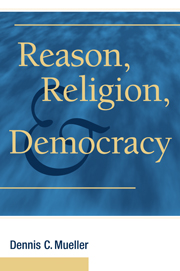Book contents
- Frontmatter
- Contents
- Preface
- 1 Liberal Democracy
- PART I FUNDAMENTALS: EVOLUTION, PSYCHOLOGY, REASONING, AND RELIGION
- PART II A HISTORICAL LOOK AT THE STATE, DEMOCRACY, AND RELIGION
- 4 The First States
- 5 Athens and Rome
- 6 The Caliphate
- 7 The Renaissance
- 8 The Enlightenment
- 9 Religion and Democracy After the French Revolution
- Epilogue to Part Two
- PART III THE INSTITUTIONS OF LIBERAL DEMOCRACY
- PART IV CHALLENGES TO LIBERAL DEMOCRACY
- References
- Author Index
- Subject Index
9 - Religion and Democracy After the French Revolution
Published online by Cambridge University Press: 05 June 2012
- Frontmatter
- Contents
- Preface
- 1 Liberal Democracy
- PART I FUNDAMENTALS: EVOLUTION, PSYCHOLOGY, REASONING, AND RELIGION
- PART II A HISTORICAL LOOK AT THE STATE, DEMOCRACY, AND RELIGION
- 4 The First States
- 5 Athens and Rome
- 6 The Caliphate
- 7 The Renaissance
- 8 The Enlightenment
- 9 Religion and Democracy After the French Revolution
- Epilogue to Part Two
- PART III THE INSTITUTIONS OF LIBERAL DEMOCRACY
- PART IV CHALLENGES TO LIBERAL DEMOCRACY
- References
- Author Index
- Subject Index
Summary
Our religion is Christ, our politics Fatherland!
(Hans Schemm, Head of National Socialist Teachers' League)Anyone gazing forward circa 1791 might well have been quite optimistic about the future course of human history. During the previous century, reason had triumphed over ignorance and superstition among the intelligentsia on both sides of the Atlantic. Its further dissemination was merely a matter of educating entire populations rather than tiny elites. Adam Smith's Wealth of Nations, published in 1776, had demonstrated the benefits of liberalizing domestic markets and international trade. The American Revolution, launched in the same year, created a truly democratic republic. The newly underway French Revolution promised a similar development in Europe. The stage seemed set for the spread of liberal democratic and economic institutions, underpinned by intelligent and rational actors.
Of course, history did not follow this course.
The Resurgence of Religion in Early-Nineteenth-Century Europe
As the ever astute Alexis de Tocqueville observed, the French Revolution became a kind of political religion itself, equally single-minded in its pursuits, equally intolerant of conflicting ideas, equally violent in its repression of heretics.
Because the Revolution seemed to be striving for the regeneration of the human race even more than for the reform of France, it lit a passion which the most violent political revolutions had never before been able to produce. It inspired conversions and generated propaganda. Thus, in the end, it took on the appearance of a religious revolution which so astonished contemporaries. Or rather, it itself became a new kind of religion, an incomplete religion, it is true, without God, without ritual, and without life after death, but one which nevertheless, like Islam, flooded the earth with its soldiers, apostles, and martyrs.
(Alexis de Tocqueville)- Type
- Chapter
- Information
- Reason, Religion, and Democracy , pp. 197 - 234Publisher: Cambridge University PressPrint publication year: 2009



